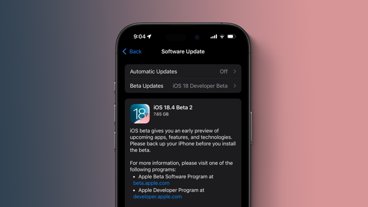Apple's legal fight with Epic over "Fortnite" and App Store rules has expanded onto another continent, with Epic launching a legal claim against Apple in Australia.
Epic Games and Apple are embroiled in a lawsuit battle over "Fortnite," the highly-popular Epic game that was pulled from the App Store in August, triggering legal activity from both sides. While the main action is taking place in US courts, Epic has decided to bring the fight to a completely different continent, by launching a lawsuit in Australia.
Filed on Wednesday in the Federal Court of Australia, Epic alleges that Apple's conduct with the App Store is a "misuse of market power" that has the effect of "substantially lessening competition" in the iOS app industry. According to Epic, Apple's conduct breaches Australian Consumer Law as well as sections of the Competition and Consumer Act 2010.
"This is much bigger than Epic versus Apple - it goes to the heart of whether consumers and creators can do business together directly on mobile platforms or are forced to use monopoly channels against wishes and interests," said Epic founder and CEO Tim Sweeney. Reasoning that Apple's original products were open platforms that anyone could code for and install software from sources of their choosing, Sweeney urges "today's digital platforms must be similarly open to fair competition."
The lawsuits commenced due to Epic's decision to add a secondary in-app payment mechanism to "Fortnite" that paid Epic directly, skipping Apple and avoiding Apple's usual 30% transaction fee. It was part of a wider fight, where Epic also requested the ability to add its own app store to the App Store, which was denied as being against the App Store Review Guidelines.
In Epic's filing, the company rails against Apple's requirement it uses the existing IAP mechanism, as well as the inability to have its own storefront. By owning and controlling the store, it "prevents the broad base of iOS device users, including in Australia, from downloading apps on iOS devices from any source other than the App Store," with such restrictions having the effect to "foreclose competition" in the app marketplace.
"Apple has locked down and crippled the ecosystem by imposing an absolute monopoly on distribution and through the restrictions placed on in-app purchases," Epic argues. "They are preventing entire categories of business and software applications from being developed in their ecosystem and this excessive control is bad for competition, choice, and innovation."
Much like the US lawsuit, Epic is not seeking damages in Australia. It is however intent on making Apple change its rules to enable alternative payment methods and for other app storefronts to exist on iOS, which Epic characterizes as "simply seeking fair access and competition that will benefit all consumers."
Given the potential earnings of an Epic-owned app store, it may gain considerably more from the digital storefront if it has its way than damages could ever provide.
 Malcolm Owen
Malcolm Owen







-m.jpg)






 Christine McKee
Christine McKee
 Marko Zivkovic
Marko Zivkovic
 Mike Wuerthele
Mike Wuerthele

 Amber Neely
Amber Neely
 Sponsored Content
Sponsored Content
 Wesley Hilliard
Wesley Hilliard









7 Comments
If you try in enough places, eventually some court might cave to these arguments.
So the issue is now about Fortnight wanting to seek fair access and competition...does that apply to in-app purchases within their games? Will they be allowing other people unaffiliated with Epic to sell add ons/expansions/etc directly within their game environment? You know...so they don't "foreclose" competition within their games?
The problems with arguing on principle is that, by definition, principles apply universally (or should, I'd think).
To use a different kind of example: I can order many products online directly from the manufacturer or purchase them through a retail store. The price difference is usually negligible due to self-competitive reasons, aka the "RRP". When purchasing directly I am engaging that company and I am naturally aware that they will learn something about me, e.g. my address, my credit card information and the like. When purchasing through a store there is no expectation that the manufacturer would learn anything about me, my relationship is with the store only. Perhaps people won't care, but the choice is there and there will be times where one may wish to control the spread of their personal information, or wish to engage with products but not necessarily their manufacturers.
I don't think I've recently seen a more vile and scum bag CEO / company than Epic, and if I could do legally, I'd punch out that scum bag Sweeney.
It will be interesting to see. Not sure why they thought the Australian courts would be especially favourable. We do have laws against "Channel Forcing" which prevents certain types of exclusivity deals. If you sell a product, you can't force the purchaser to only use specific services. Usually that's taken as being if Telstra sell me a phone outright, they can't force me to only use Telstra network services, I have to be able to switch networks if I so choose.
Does the App Store count as channel forcing? Maybe under a very narrow view. Does it apply to buying in-game items for Fortnite? I don't see how, since I can buy them from a web page, which is not restricted.
Such a shame and waste for Epic to start this useless BS. It would have been nice to see Unreal 5 engine running on an M1 ... highly doubt they will support the new chip with this ongoing litigation and tension between the companies. Users will end up being the losers in this battle.